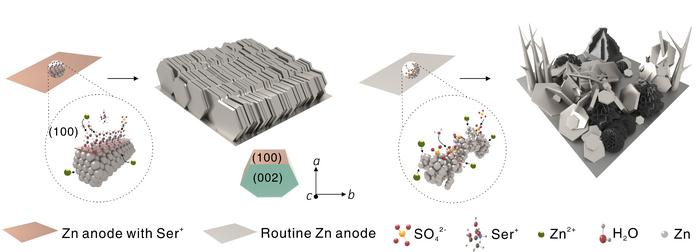Aqueous zinc-ion batteries have garnered attention for their cost-effectiveness, safety, and environmental credentials. However, their widespread adoption has been plagued by severe zinc dendrite growth, which often induces poor reversibility.
Now, a research team led by scientists from the Hefei Institutes of Physical Science in China has found that the addition of serine cations to the electrode/electrolyte interface in the aqueous zinc-ion battery would obstruct the rampant growth of the Zn (100) plane.
Namely, high-activity facet is often prone to side reactions, including deterioration of the zinc anode and declining stability of the battery. Therefore, tailoring the zinc deposition behavior is vital to prevent dendrite growth.
The researchers conducted a (100) facet-termination engineering strategy employing serine (Ser, C3H7NO3) as the interface structure conditioner into a zinc sulfate (ZnSO4) system.
This endowed the Zn anode with a long cyclic life of more than 800 h for Zn//Zn batteries and a high average Coulombic efficiency of 99.8% at 5 mA cm−2 and 5 mAh cm−2 for Zn//Cu batteries.
When assembled with commercial vanadium pentoxide (V2O5), the full battery delivers a high capacity of 345.1 mAh g−1 at 5 A g−1 with retention of 74.1% over 2000 cycles.
According to the researchers, their findings provide a promising strategy for improving the zinc anode and are expected to be applied to other metal anodes with poor stability and reversibility.
They discuss their results in “Facet-termination promoted uniform Zn (100) deposition for high-stable zinc-ion batteries,” published in Advanced Energy Materials.
This content is protected by copyright and may not be reused. If you want to cooperate with us and would like to reuse some of our content, please contact: editors@pv-magazine.com.




By submitting this form you agree to pv magazine using your data for the purposes of publishing your comment.
Your personal data will only be disclosed or otherwise transmitted to third parties for the purposes of spam filtering or if this is necessary for technical maintenance of the website. Any other transfer to third parties will not take place unless this is justified on the basis of applicable data protection regulations or if pv magazine is legally obliged to do so.
You may revoke this consent at any time with effect for the future, in which case your personal data will be deleted immediately. Otherwise, your data will be deleted if pv magazine has processed your request or the purpose of data storage is fulfilled.
Further information on data privacy can be found in our Data Protection Policy.